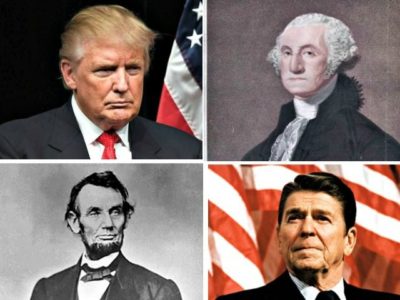President Donald Trump’s proclamation that Sunday, September 3, shall be a National Day of Prayer for the victims of Hurricane Harvey follows a tradition first established by George Washington and continued by presidents including Abraham Lincoln and Ronald Reagan, as well as being ratified by Congress.
“No people can be bound to acknowledge and adore the Invisible Hand which conducts the affairs of men more than those of the United States,” Washington declared in his first Inaugural Address, the first words uttered by a president of the United States.
It is therefore hardly surprising that when the first Congress passed a resolution on September 25, 1789, calling upon Washington to proclaim a National Day of Prayer, the Father of His Country issued a proclamation to all Americans that November 26, 1789, would be a day to “offer our prayers and supplications to the Great Lord and Ruler of Nations, and beseech him to pardon our national and other transgressions.”
“Whereas it is the duty of all Nations to acknowledge the providence of Almighty God, to obey his will, to be grateful to his benefits, and humbly to implore his protection and favor,” Washington’s proclamation begins, then encourages Americans to pray in their churches and homes on the designated day.
John Adams succeeded Washington as America’s second president, and he proclaimed a day in 1798 to “be observed throughout the United States as a day of solemn humiliation, fasting, and prayer.” Adams did so a second time in 1799.
James Madison, who in addition to being America’s fourth president was also the primary author of the Constitution, issued four proclamations for National Days of Prayer, as did subsequent presidents.
On March 30, 1863, Abraham Lincoln proclaimed a Day of National Humiliation, Fasting, and Prayer, which began:
Whereas it is the duty of nations as well as of men to owe their dependence upon the overruling power of God, to confess their sins and transgressions in humble sorrow, yet with assured hope that genuine repentance will lead to mercy and pardon, and to recognize the sublime truth, announced in the Holy Scriptures and proven by all history, that those nations only are blessed whose God is the Lord;
After specifying which day was designated as a day of prayer, Lincoln continued:
I do hereby request all the people to abstain on that day from their ordinary secular pursuits, and to unite at their several places of public worship and their respective homes in keeping the day holy to the Lord and devoted to the humble discharge of the religious duties proper to that solemn occasion.
This tradition continued throughout the decades, until Congress in 1952 enacted a statute calling upon the president to proclaim a National Day of Prayer once per year.
In 1988, President Reagan signed amendments to the 1952 law, making the first Thursday of each May the National Day of Prayer for all Americans.
But many presidents have proclaimed days of prayer in addition to the one in May, often in response to national tragedies, such as President George W. Bush, who proclaimed a National Day of Prayer after the terrorist attacks of September 11, 2001.
Keeping with this tradition, on September 1, President Trump issued a proclamation that includes:
Now, therefore, I, Donald J. Trump, President of the United States of America, do hereby proclaim September 3, 2017, as a National Day of Prayer for the Victims of Hurricane Harvey and for our National Response and Recovery Efforts. We give thanks for the generosity and goodness of all those who have responded to the needs of their fellow Americans. I urge Americans of all faiths and religious traditions and backgrounds to offer prayers today for all those harmed by Hurricane Harvey, including people who have lost family members or been injured, those who have lost homes or other property, and our first responders, law enforcement officers, military personnel, and medical professionals leading the response and recovery efforts. Each of us, in our own way, may call upon our God for strength and comfort during this difficult time. I call on all Americans and houses of worship throughout the Nation to join in one voice of prayer, as we seek to uplift one another and assist those suffering from the consequences of this terrible storm.
Some left-of-center pundits claim such National Days of Prayer violate the Establishment Clause, the provision of the Constitution’s First Amendment that says the government shall not establish a religion.
But as the Supreme Court reaffirmed as recently as its seminal 2014 case Town of Greece v. Galloway, all the Establishment Clause forbids is the government officially adopting a national religion or coercing Americans to participate in a religious activity that violates their conscience.
In this context, ordering Americans to attend church to pray this Sunday and threatening them with federal prison if they refuse would violate the Establishment Clause, but issuing a proclamation that encourages all Americans who are willing to offer prayers that accord with their individual conscience is entirely constitutional.
Ken Klukowski is senior legal editor for Breitbart News. Follow him on Twitter @kenklukowski.
Source: Breitbart

